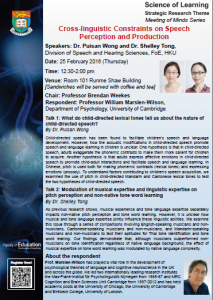Cross-linguistic constraints on speech perception and production

Speakers: Dr. Puisan Wong and Dr. Shelley Tong, Division of Speech and Hearing Sciences, FoE, HKU
Date: 25 February 2016 (Thursday)
Time: 12:30-2:00 pm
Venue: Room 101 Runme Shaw Building [Sandwiches will be served with coffee]
Chair: Professor Brendan Weekes
Respondent: Professor William Marslen-Wilson, Department of Psychology, University of Cambridge
Register
Talk 1: What do Child-directed Lexical Tones Tell Us about the Nature of Child-directed Speech?
By Dr. Puisan Wong
Child-directed speech has been found to facilitate children’s speech and language development. However, how the acoustic modifications in child-directed speech promote speech and language learning in children is unclear. One hypothesis is that in child-directed speech, adults exaggerate the phonemic contrasts to make them more salient for children to acquire. Another hypothesis is that adults express affective emotions in child-directed speech to promote child-adult interactions and facilitate speech and language learning. In Chinese, pitch is used both for making phonemic contrasts (lexical tones) and expressing emotions (prosody). To understand factors contributing to children’s speech acquisition, we examined the use of pitch in child-directed Mandarin and Cantonese lexical tones to test the two hypotheses of child-directed speech.
Talk 2: Modulation of Musical Expertise and Linguistic Expertise on Pitch Perception and Non-Native Tone Word Learning
By Dr. Shelley Xiuli Tong
As previous research shows, musical experience and tone language expertise separately impacts non-native pitch perception and tone word learning. However, it is unclear how musical and tone language expertise jointly influence these linguistic abilities. We examine this issue through a series of comparisons involving English-speaking musicians and non-musicians, Cantonese-speaking musicians and non-musicians, and Mandarin-speaking musicians and non-musicians to test their aptitudes for Thai tone identification and tone word leaning. Our findings demonstrate that, although musicians outperformed non-musicians on tone identification regardless of native language background, the effect of musical expertise on tone word learning was modulated by native language complexity.
About the Speakers
Dr. Puisan Wong is an Assistant Professor in the Division of Speech and Hearing Sciences in the Faculty of Education. Her research interests are speech perception, production and training in children, aged-adults and second language learners with or without communication disorders.
Dr. Shelley Tong is Assistant Professor in the Division of Speech and Hearing Sciences at the University of Hong Kong. Her research interests, including speech perception and reading comprehension difficulties in bilingual children, have resulted in her development of two theories explaining the mechanisms of Chinese children’s lexical tone perception.
About the Respondent
Prof. Marslen-Wilson has played a vital role in the development of psychological theories of language and cognitive neuroscience in the UK and across the globe. He led two internationally leading research institutes the Max-Plank-Institut für Psycholinguistik Nijmegen from 1985-87 and MRC Cognition and Brain Sciences Unit Cambridge from 1997-2012 and has held academic posts at the University of Chicago, the University of Cambridge and Birkbeck College, University of London. He was a Sloan fell MIT 1980-81; Visiting Professor at the University of Southern California 1989-90; Visiting Professor at the University of Arizona 1994-95; Honorary Director at Beijing Normal University 1995-present; Fellow Birkbeck College London 2000-present; Fellow of Wolfson College Cambridge 2000-present; Wei Lan Visiting Professor at the Chinese University of Hong Kong 2000; President of the Experimental Psychology Society 2008-10; Fellow of the Academia Europe 1996-present; and Fellow of the British Academy 1996-present.




